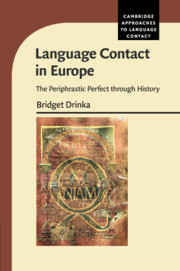Book contents
- Frontmatter
- Contents
- Series Editor's Foreword
- Acknowledgments
- Abbreviations, Based on the Leipzig Glossing Rules
- 1 Language Contact in Europe: The Periphrastic Perfect through History
- 2 Languages in Contact, Areal Linguistics, and the Perfect
- 3 The Perfect as a Category
- 4 Sources of the Perfect in Indo- European
- 5 The Periphrastic Perfect in Greek
- 6 The Periphrastic Perfect in Latin
- 7 The Charlemagne Sprachbund and the Periphrastic Perfects
- 8 The Core and Peripheral Features of the Romance Languages
- 9 The Early Development of the Perfect in the Germanic Languages
- 10 The Semantic Shift of Anterior to Preterite
- 11 The Balkan Perfects: Grammaticalization and Contact
- 12 Byzantium, Orthodoxy, and Old Church Slavonic
- 13 The l- perfect in North Slavic
- 14 Updating the Notion of Sprachbund: New Resultatives and the Circum- Baltic “Stratifi ed Convergence Zone”
- 15 The have Resultative in North Slavic and Baltic
- 16 Conclusions
- Notes
- Bibliography
- Index
Series Editor's Foreword
Published online by Cambridge University Press: 23 February 2017
- Frontmatter
- Contents
- Series Editor's Foreword
- Acknowledgments
- Abbreviations, Based on the Leipzig Glossing Rules
- 1 Language Contact in Europe: The Periphrastic Perfect through History
- 2 Languages in Contact, Areal Linguistics, and the Perfect
- 3 The Perfect as a Category
- 4 Sources of the Perfect in Indo- European
- 5 The Periphrastic Perfect in Greek
- 6 The Periphrastic Perfect in Latin
- 7 The Charlemagne Sprachbund and the Periphrastic Perfects
- 8 The Core and Peripheral Features of the Romance Languages
- 9 The Early Development of the Perfect in the Germanic Languages
- 10 The Semantic Shift of Anterior to Preterite
- 11 The Balkan Perfects: Grammaticalization and Contact
- 12 Byzantium, Orthodoxy, and Old Church Slavonic
- 13 The l- perfect in North Slavic
- 14 Updating the Notion of Sprachbund: New Resultatives and the Circum- Baltic “Stratifi ed Convergence Zone”
- 15 The have Resultative in North Slavic and Baltic
- 16 Conclusions
- Notes
- Bibliography
- Index
Summary
The Cambridge Approaches to Language Contact (CALC) series was set up to publish outstanding monographs on language contact, especially by authors who approach their specific subject matter from a diachronic or developmental perspective. Our goal is to integrate the ever-growing scholarship on language diversification (including the development of creoles, pidgins, and indigenized varieties of colonial European languages), bilingual language development, code-switching, and language endangerment. We hope to provide a select forum to scholars who contribute insightfully to understanding language evolution from an interdisciplinary perspective. We favor approaches that highlight the role of ecology and draw inspiration both from the authors’ own fields of specialization and from related research areas in linguistics or other disciplines. Eclecticism is one of our mottoes, as we endeavor to comprehend the complexity of evolutionary processes associated with contact.
We are proud to add to our list Bridget Drinka's Language Contact in Europe: The Periphrastic Perfect through History. Few researchers have undertaken the daunting task that the author has embarked upon in this comprehensive book, namely to track down the origins of the periphrastic perfect construction in Europe (which is quite complex) and to trace its diffusion across the map, while at the same time assessing the role of language contact as an essential element in this development. The book takes a wide-angle perspective, spanning the geographical breadth of Europe – from Portuguese to Finnish, from Icelandic to Bulgarian – and it delves into the 2,500-year-old history of the perfects and resultatives on this continent. Besides large-scale developments, Drinka also focuses on the micro-level responses to these “macro-historical processes”: she documents not only the movement of innovations across a population, such as the spread of HAVE-resultatives from German into the West Slavic languages, but also the role of the individual speaker as the transmitter of change. She presents, for example, the remarkable case of the Aragonese scribe who, in May 1147, switched from Visigothic to Caroline script, signaling not just a change in the scribal tradition but also an entire realignment of cultural allegiance toward trans-Pyrenean norms. This realignment is also reflected in the increased use of BE perfects in this area. The role of sociohistorical events as actuators of change is one of the strengths of this book.
Drinka adduces extensive empirical evidence to support her striking – and undoubtedly controversial – conclusions concerning the origin and spread of the perfects.
- Type
- Chapter
- Information
- Language Contact in EuropeThe Periphrastic Perfect through History, pp. xi - xiiPublisher: Cambridge University PressPrint publication year: 2017

